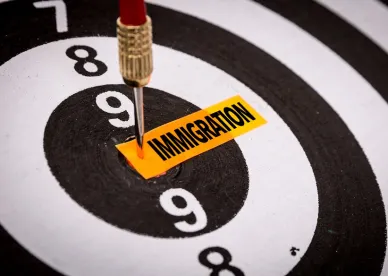New USCIS filing fees will go into effect on October 2, 2020, under a new final rule published by the Department of Homeland Security (DHS) in the Federal Register on August 3, 2020. This rule raises fees by a weighted average of 20% and changes the current fee structure to impose specific fees per visa category.
USCIS, a fee-based agency, has stated the increase in fees was required to avoid a DHS projected deficit of $1 billion per year. Some fees will decrease, but others will increase dramatically – such as a more than 80% increase for citizenship applications. Other larger percentage increases include popular business-related petitions:
-
51% increase for TN and E petitions to $695
-
75% increase for L petitions to $805
-
53% increase for O petitions to $705
-
34% increase for I-765 Employment Authorization Documents to $550 (excluding DACA)
Employers whose workforce is comprised of at least 50% H-1B or L-1 workers will see even bigger increases. Already paying an additional $4,000 for a new H-1B visa and an additional $4,500 for a new L-1 visa, those companies will be required to pay the additional fees for renewals as well. It is reported that this alone will bring in $200 million per year in fees to USCIS.
Employers filing H-2A and H-2B petitions for temporary, seasonal agricultural and non-agricultural workers also will see an increase, from $460 to $850 (85%) and $715 (55%), respectively. This comes despite the Administration’s recognition of the essential nature of workers involved in the food supply chain during the COVID-19 pandemic national emergency.
The USCIS Premium Processing fee, which brought in $2.39 billion in fees to USCIS between 2014 and 2019, will not increase, but the processing time has changed from 15 calendar days to 15 business days, up from two weeks to three weeks.
Comments on the new rule include a suggestion that USCIS increase its own efficiency instead of “charging more and providing less service.” Others noted the Administration’s own policy failings created the need for increased fees, citing the following as areas of concern:
-
Frivolous Requests for Evidence
-
“Extreme vetting”
-
Long suspensions of premium processing
-
Unnecessary in-person interviews
-
Increased denaturalization efforts
-
Litigation of improperly denied applications
In addition, commentators complained of the negative impact the increased fees would have on potential immigrants, the businesses that need to employ them, and the economy. To these and other comments submitted, DHS responded that it understands immigrants make significant contributions to the United States economy, but this final rule is not intended to impede or limit naturalization or legal immigration. Other commentators suggest the Administration’s policies have already impeded immigration and fee increases are not likely to help alleviate that.
USCIS also plans to publish updated forms before the new fees go into effect, including a new Form I-129 and a new Form I-765.




 />i
/>i
